This is for my film and lit class, it is a discussion of the way that various elements of society interact: economics, ideology, politics. That sounds like super fun, right?
So I understand all of the pieces that we have been talking about, but I am still struggling to comprehend the whole.
I understand
Louis Althusser's Interpellation (a cop says: “Hey you!” and you say: “Yes Sir?” because you both participate in an ideological framework). I also understand
Randy Martin's financialization of daily life (rather than freeing us, this finacialization has added an additional weight of labor to our off hours while we fret over pensions and mortgages). I also understand when Martin writes (and I think it is a big point) that over the past thirty or so years our society has seen a “normalization of risk embrace”.
I understand all of those things and I agree with them, however what I am not quite getting is how those things all connect together to form one seamless philosophy that explains our age.
Martin is able to eloquently connect the afore mentioned finacialization to Neocons and America’s new imperialism, but I am still having trouble believing those connections, maybe that’s why I’m not seeing the bigger picture. Martin writes, “Yet, while imperialism has returned full throated to the councils of international relations, finance is rarely seated at the table.” He goes on to explain that imperialism is usually viewed as a national or corporate interest, while the financial aspect is often ignored. I understand all of that.
So what is the larger idea? What am I missing?
Martin seems to indicate that our society got drunk on visions of the future, that we took on massive risk (debt) in order to better secure that future, but that a paradigm shift in geopolitics and finance essentially pulled the rug out from under us. Personally I don’t think that the new paradigm began with 9/11, but rather with the American response to it. So now we are a society whose future (or potential future) exists concurrently (and dependant on) our present. On top of that, as David Harvey pointed out, once our economic and cultural influence waned, we were left with nothing but our military might with which to address the world. Our government (being run not just by religious zealots, but also Neoconservatives with a very specific world view) acted in the only way that it thought appropriate and lashed out with what is generally called the new American Imperialism. We, all of us having been interpellated, went along because that is what the new American patriotism asked of us, not to mention we were all busy buying houses we couldn’t afford because we felt that a nice three bedroom McMansion was our new manifest destiny.
So maybe I do understand after all.
Or I’m just so wrong that I think I’m right.
Either way, it is all interesting food for thought.




